
REVIEW: Bug and Interview
It may seem slightly unusual to be reviewing two films together that, at first glance, share little in common. Interview, a satirical drama, was directed by, co-written and stars Steve Buscemi, a performer better known for his awkward screen persona than his work behind the camera (Trees Lounge). Bug, a paranoiac thriller, is the latest film from director William Friedkin, who, in the now distant halcyon days of the ‘70s helmed The French Connection, The Exorcist, and Sorcerer.
And yet, after sitting through back-to-back screenings of Interview and Bug last week the decision to schedule them together seemed more than coincidental. In spite of their differing generic and artistic ancestry these two films actually share some noteworthy similarities. For starters, both narratives focus almost exclusively upon a central male-female conflict. In Interview Buscemi plays Pierre, a political correspondent sent by his editor to interview self-absorbed Hilton-esque celebrity, 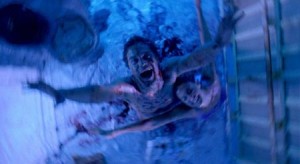 Katya (Sienna Miller). Not surprisingly, the pair quarrel instantly, trading jibes in an escalating game of one-upmanship, as the setting shifts from a restaurant back to Katya’s apartment.
Katya (Sienna Miller). Not surprisingly, the pair quarrel instantly, trading jibes in an escalating game of one-upmanship, as the setting shifts from a restaurant back to Katya’s apartment.
The dynamic in Bug is slightly different. Ashley Judd plays Agnes, a loner waitress living out of a roadside motel whose life takes a turn when she is introduced to Peter (Michael Shannon), an eccentric drifter with a secret past. As their relationship becomes more intimate they find themselves drawn into an ever-intensifying paranoia about secret government testing, mind control, technology and you guessed it, bugs. Like Interview, in which Katya’s apartment serves as the central arena for the pair’s tête-à-tête, Bug’s relocation of the action to Agnes’ motel room offers a comparable, albeit decidedly more claustrophobic, narrative stage.
In both films, setting becomes important to the conflicts that ensue from these chance encounters. When Pierre first enters the apartment he seems intent establishing control over the space, gulping down expensive Scotch, usurping the television remote, and spying in Katya’s diary. But Pierre doesn’t have it all his own way. Displaying a seductive aloofness and feigning vulnerability, Katya gradually redirects Pierre’s voyeuristic probings back upon the reporter. It’s within this struggle for power, manifested in the plot as a search for each character’s ‘truth’, that Buscemi labours to build Interview’s dramatic energy.
While the incessant back-and-forth works well initially, deriving humour from the utter incompatibility of Pierre and Katya’s worlds, Inteview struggles to move beyond this fairly simple premise. As the pointlessness of their bickering grows tiresome the film’s lack of depth becomes achingly apparent. And yet there’s also a sense that this vacuity may be deliberate. In the latter stages of the film it becomes obvious that neither interviewer or interviewee or being entirely honest about the life experiences they’re sharing with one another. 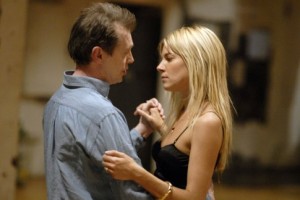 It’s as if Buscemi is suggesting that Pierre’s world of politics and foreign affairs is just as artificial as Katya’s glossed up celebrity lifestyle.
It’s as if Buscemi is suggesting that Pierre’s world of politics and foreign affairs is just as artificial as Katya’s glossed up celebrity lifestyle.
He may be correct, but it’s a fairly innocuous statement that lacks the satirical nous to render their conflict dramatically arresting over the journey. What takes place instead is a series of awkward sequences in which the pair come together in a passionate embrace, and later dance around Katya’s living room floor. Such moments, clearly intended to break the monotony of their verbal stoush, might have worked if Interview had been staged as a play but on-screen they come-off feeling clunky and forced.
It’s perhaps ironic then, given Interview is actually a remake of a Dutch film, and Bug was adapted from the stage, that the latter actually proves the more impressive work. While Bug’s ‘theatricality’ is clearly visible – the restricted space, the emphasis on character and script to drive the narrative – and suffers partly from a slow build up, the film gathers momentum as it wears on. Where Interview seemed limited to a battle of wills, Bug works to demonstrate the loss of self that results from each character’s identification with the other. There’s more at stake here, and that’s why it mostly works.
As Friedkin collapses the initially disparate personalities of Agnes and Peter through their hysteria about insect invaders, he lends the film an appealing sense of inexorable fate. Bound together towards a claustrophobic doom, the motel room becomes transformed into a cocoon-like space reflecting their paranoia. Covered in aluminium foil, insect-zappers hanging from each part of the ceiling, Agnes’ motel room provides a visually arresting space for the film’s dramatic conclusion. In particular, Ashley Judd’s triumphant scream when she pieces together the ‘insect conspiracy’, “I am the super mother bug!” offers an exhilarating release. It may not be vintage Friedkin, but Bug still has its rewards.
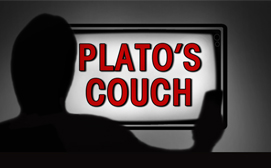

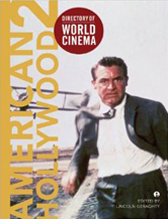

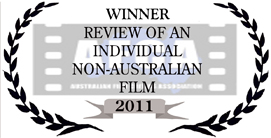
RSS feed for comments on this post. TrackBack URI